Glen E. Friedman doesn’t have a smartphone. He doesn’t like to give out his number. And he’s relentlessly protective of his work’s integrity.
That became clear early in our conversation last week, when I asked the longtime counterculture photographer if he had any new work to promote since his 2014 collection of essays and photography, My Rules.
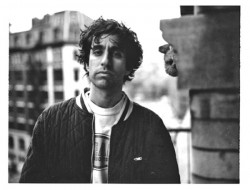
Glen E. Friedman (by Brett Ratner)
“F**k that,” Friedman said. “Unless you’ve read every word in the book already, don’t come to me and ask me what’s next.”
Now 53, with a photography career spanning almost 40 years, Friedman has spent most of his life embedded in subculture, and he’s just as uncompromising as many of the people he shoots.
Friedman photographed the SoCal skateboarders who inspired the documentary Dogtown and Z-Boys. Working with Def Jam’s Russell Simmons and Rick Rubin, he shot now-famous images of Run-DMC, Ice-T, Public Enemy and The Beastie Boys in their early years. He’s published a book of Fugazi images, and he was around during the peak years of D.C.’s hardcore scene.
Ex-Black Flag frontman Henry Rollins — one of Friedman’s favorite subjects — has said the photographer “was there at the beginning of so much cool stuff in so many different areas, it’s not funny.”
Sunday, Friedman returns to D.C. for a conversation with punk-rock veteran Alec MacKaye at the Martin Luther King Jr. Memorial Library, organized by Highway magazine. In advance of their talk, Friedman chatted with me about his frustration with the music industry, his loyalty to radicalism and a subject that seemed to put him on the defensive: the lack of women in his photographs.
This interview has been edited for clarity and brevity.
Bandwidth: Do people pressure you to be more prolific?
Glen E. Friedman: I couldn’t imagine being more prolific than I am.
But do people — like, say, an agent or manager — pressure you to put out more work?
No, no, no. I’ve never had an agent or a manager in my life. I’ve been doing this since I was 14. I learned all the business myself. So people might want to see more, but I don’t want to water down the archive. I feel like I’ve been able to do some pretty incredible stuff and, why ruin the credibility by shooting s**t?
Are you still out there shooting actively?
No, not at all.
When did you stop?
I didn’t stop. But it sounds like you mean someone who’s going to shows in a fairly regularly way, and I don’t do that. I still shoot pictures. I have an 8-year-old and I shoot pictures of him with film every couple of months. If something inspires me, I’ll shoot, but there are so many people shooting so much nowadays. It seems as though they all miss the correct moments, and I just kind of sit back and laugh and say “whatever,” you know?
“I’m not loyal to any overall scene. What I am loyal to is radical behavior and people wanting to change the world and make it a better place.”
What bands have inspired you recently?
I’m mostly just inspired by all the old music that I listen to. In the last year or two, I really liked seeing that Flag reunion — that was great. I love those guys. I like The Evens, of course. I call The Evens adult punk rock. I like Chain & the Gang. The usual suspects of old punks. There’s hip-hop records out there that I like, too. If I was super inspired, I would remember [their names], and then I would maybe see if they’ve got good imagery, and if they don’t, maybe give someone a call.
But everyone nowadays is into having managers and people who handle them, and no one just deals with stuff on their own. I’m really turned off by all that. I’ve never really done work with an artist if it wasn’t the artist who came directly to me. All that f*****g other middle level — I mean, some people need it, but I don’t f**k with that.
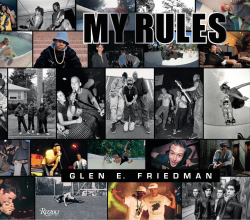
“My Rules,” the 2014 photography collection by Glen E. Friedman
You seem pretty loyal to the punk scene. I was reading an interview with you where you’re like, “Yup, still listening to Fugazi.”
Look, I mean, I’m 53 now, and I’m not out there digging in the crates like when I was a kid, looking for the hottest, newest stuff. And nowadays everything’s just f*****g spoonfed to everyone on a website.
I don’t think it’s [loyalty] — I’m loyal to my friends, but I’m not loyal to any subcultures, necessarily, unless they deserve that loyalty. What I’m inspired by, I like to share with other people. It’s not blind loyalty. There are plenty of s****y bands and plenty of s****y everything, and I’m not loyal to any overall scene. What I am loyal to is radical behavior and people wanting to change the world and make it a better place.
So is that what you saw in D.C.’s punk scene, and in Fugazi? People who were trying to improve the world?
I first started coming to D.C. in 1982. I’d been there before, skateboarding, many years before, but I came down to see Minor Threat. I became very close friends with a lot of guys down there. It was a very unique scene, it was very intense. But they also had a sense of humor.
But really, it was the music that inspired me. It wasn’t all the social s**t necessarily that was going on within the scene, it was just the music was inspiring. It was f*****g great, and kicked my ass. As a young kid, those things are vital to your life.
Fugazi, the level of integrity that they exhibited was totally inspiring and something that I lived by, myself. And the emotion that was pouring out of what they were doing was phenomenal… So I started taking pictures of them every so often. I didn’t bring my camera every time. But there came a point of seeing Fugazi shows where it was like, “F**k! I should have had my camera tonight. F**k! I missed some great moments.” Even though there was really no place to get those photographs published, because no one was interested in putting out pictures of Fugazi [at the time].
Have you always stuck to subjects you identify with? Have you ever taken a photo of someone you had absolutely no interest in shooting?
I always identify with my subjects. There are subjects that I’ve shot that I have not so much interest in. But they’re associated with someone who I do respect. Like, if Rick Rubin asked me to photograph a particular band for him, and he was able to express to me why it meant so much to him that I did it, [I’d do it]… Other than [for] the financial reward, because that’s usually the last thing that comes into play. It’s really about what we’re all feeling when we get together and talk about the artist and their art.
But I have to say those are my least favorite things to do. When I’m into it, the work is usually better.
You’ve taken a lot of photos of young, tough dudes. Do you ever find that they’re pretending to be someone else in front of the camera?
Very often they aren’t as rough and tough or as rebellious as they appear. But to be honest, that’s how I see them, and how their music portrays them, and how I idealize them before I know them. So even if someone isn’t the toughest guy in real life, if that’s how he’s portrayed in his own work… that’s what I’m going to do. I don’t consider myself a documentarian. I’m trying to inspire people. I’m not just trying to show people what’s there. I’m trying to f*****g wake them up.
“I don’t think the word ‘integrity’ is even in the vernacular anymore. People don’t get it. They consider it a success if someone comes to them to sponsor their tour or if they have some brand behind them.”
What female counterculture icons have you photographed? I know that you recently shot Pussy Riot. Anyone else?
I’d say there’s only a few. And it’s not by any choice. I’m not sexist at all in that way, or in any way, I would hope. But they weren’t around. There were no — at the time I was shooting skateboarding, there were no female skateboarders that were of the stature, as far as how they were riding, like the guys that I was shooting.
At punk-rock shows, there were a few women involved, and I shot pictures of some of them, but the numbers were not there. And they were not the ones inspiring me and generally not inspiring many people in the scene. Certainly they were inspiring women in the scene, even if they weren’t in a great band, [by] just the fact that they were up there on the stage. But again, I’m not a documentarian on that level, just taking pictures of everyone. I was taking pictures of things that were overwhelmingly, fantastically inspiring.
The most important bands that I shot, and the ones that inspired me the most, unfortunately there weren’t too many women in them. And that’s just a sign of the times. It’s not sexist in any way. It’s just that — what am I gonna say, that I love listening to Siouxsie and the Banshees? I don’t. Do I like The Fall? No, I don’t like them either. One has a male singer, one has a female singer. It has nothing to do with the sex. If they f*****g kick my ass and inspire me, I’m going to shoot pictures of them.
But recently, those women from Pussy Riot and what they’ve done, I mean, jeez. They f*****g ended up in the Gulag. They’re f*****g badass women. And they were very inspirational to me. That’s probably one of the most recent pictures of someone who’s involved with music that I ever shot. Although their music isn’t even very good, it’s just their f*****g attitudes and what they’ve done. They’re incredible.
You’ve said that when you were younger, shooting the skateboarding, punk and hip-hop scenes, that you lived for those things. What do you live for now?
I live to still inspire people in the best way that I can through a lot of my old pictures. It’s really amazing that I took most of the pictures that I’m known for half of my life ago, practically. But they still inspire to this day. And I didn’t realize when I was taking them that they would have a shelf life at all.
I guess I live for just continuing to inspire people with things that I’ve learned. I have a particular lifestyle, I have a particular view of the world, and I would like to inspire more people to think for themselves — and maybe in the same direction that I do. Not to have copycats or something, but a way that I see we could all make the world a better place. Stop eating animals. Care about the environment. Do things from the heart, have some integrity. These are touchstones that I believe that people are lacking these days, unfortunately.
I don’t think the word “integrity” is even in the vernacular anymore. It’s like, people don’t get it. They consider it a success if someone comes to them to sponsor their tour or if they have some brand behind them. To me, that’s the antithesis of what we want.
For kids nowadays, that’s the goal, is to have corporate support. As far as I’m concerned, that’s the last resort.
Glen E. Friedman talks with Alec MacKaye 2 p.m. on Oct. 25 at the D.C. Public Library downtown.


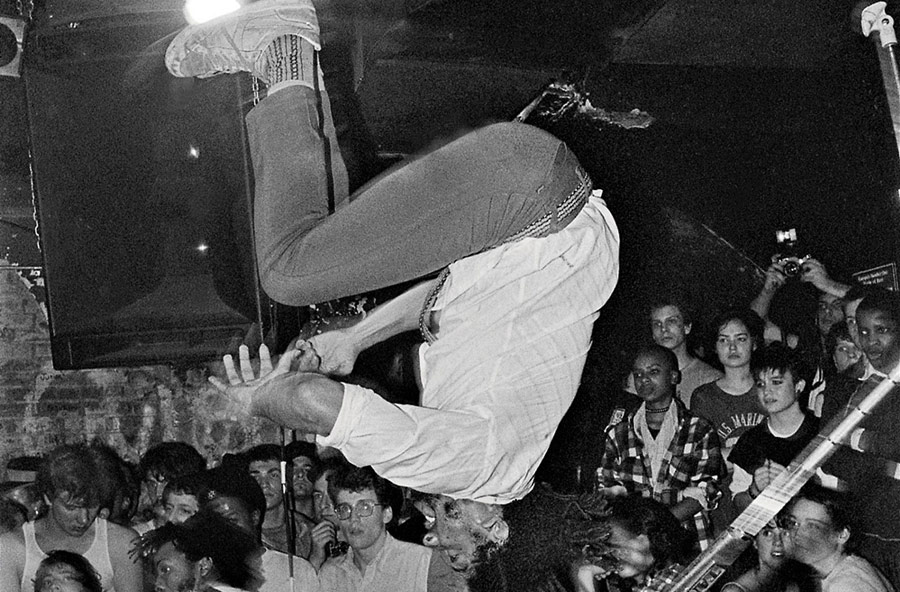
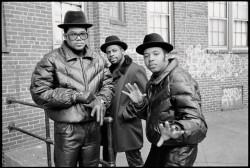
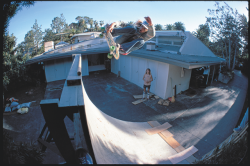
Pingback: District Line Daily: Momofuku Madness | Washington news()
Pingback: Glen E. Friedman: ‘I’m Trying To Wake People Up’ | Authentic Sounds()